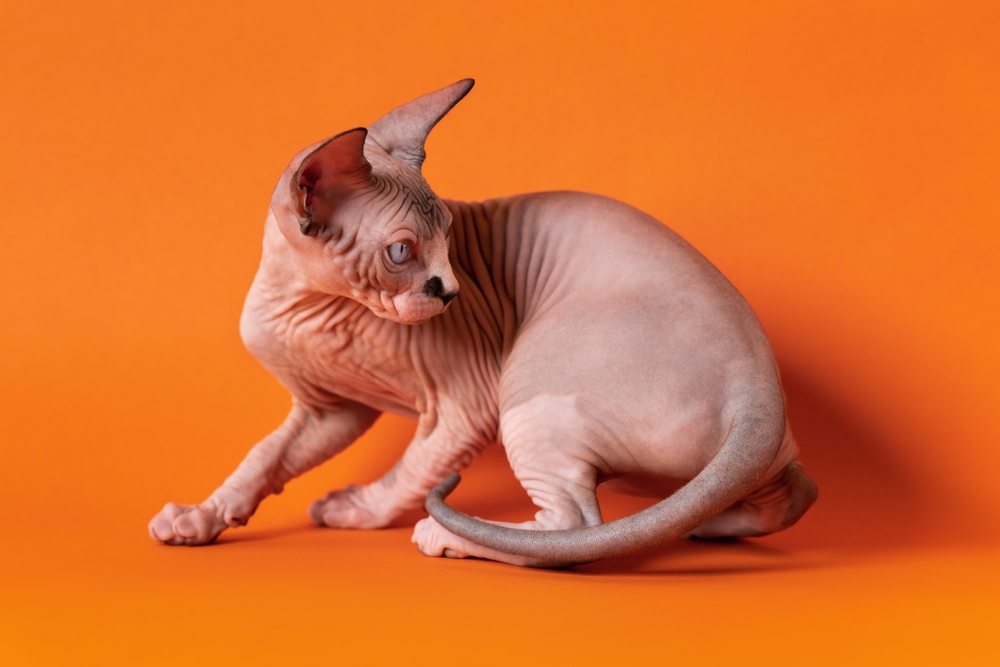Cats are walking bundles of adorableness, but they’re also mischief incarnate. If you love cats as much as we do, you’ve probably witnessed your fair share of unusual feline behavior. Whether your fur baby enjoys snacking on grass, sleeping away most of the day, zooming through the house at top speed, or chasing her tail, you’ve most likely looked at your cat more than once and wondered, “What’s up with that?” If you’ve ever wondered whether your cat’s antics are just a cat being a cat, or if they’ve become cat behavior problems, you’re in luck. We’re here to decode some of the most unusual cat behaviors – and give you a few tips on how to curb them if necessary.

Why do cats chase their tails?
If you have a young kitten, tail-chasing is part of everyday life. Kittens are intrigued by anything that moves, be it their own tail or your feet underneath the covers. As kittens grow and develop, they begin to realize that their tails are attached to their bodies and lose interest in chasing and biting their own body parts. If your cat was an avid tail-chaser as a kitten, it’s probably nothing to worry about if this behavior continues into adulthood.
But what if your cat suddenly begins chasing her tail as an adult? While it can be entertaining to watch your adult feline friend chase and play with her tail, the experts at the Merrimack River Feline Rescue Society say it could be cause for concern. In fact, your cat might not be playing with her tail at all.
Tail chasing in adulthood can be a symptom of boredom, but it might also be your cat’s way of telling you that something is wrong. Compulsive behaviors like tail chasing or racing through the house could be indicative of anxiety. If your fur baby has allergies or a medical condition such as feline hyperesthesia syndrome (FHS), their behavior could be a response to itching or overactive nerves. Don’t be afraid to take your cat to the vet for a checkup if you’re concerned. A veterinarian will be able to diagnose any underlying causes and advise you on how to help your cat.
Why do cats randomly run around the house?
Just like dogs, sometimes cats are seized by a fit of the zoomies. As entertaining as it can be to watch your fur baby race through the house at top speed, cat zoomies can pose a hazard to your health. Cats can run at an impressive 30 miles per hour – as fast as Usain Bolt – and you may not be able to prevent a fall if your cat races in front of you. So, why do cats get the zoomies? As it turns out, there’s a simple answer: boredom.
If you want to curb your cat’s enthusiasm, ensure that she gets plenty of exercise during the day. Make sure to play with her using a laser pointer or an interactive cat toy, and don’t forget to pick up a cat tree for your fur baby to climb. Please remember not to engage your cat in playtime using your fingers as you could inadvertently teach her that biting and scratching are acceptable behaviors.

Why do cats eat grass?
From the most nutritious food to tasty treats, you make sure your feisty feline has everything she needs. So, why does your cat eat grass? Vomiting when we’ve eaten something that doesn’t agree with us is miserable, but it’s also something of a relief. As it turns out, it’s the same for cats. Stray and feral cats consume their prey whole, fur, feathers, beak, and all.
But a cat’s digestive system is incapable of dissolving certain material, which is where grass comes in. Cats also lack the ability to digest grass, so snacking on your freshly mowed lawn induces regurgitation, helping them vomit up indigestible materials. Grass also serves as a laxative, helping to relieve bloating and constipation. The only way you can prevent your cat from eating grass is by keeping her exclusively indoors. And if Miss Mittens still suffers from digestive problems, your vet may recommend pumpkin as a tastier alternative.
Why do cats sleep so much?
The average house cat sleeps anywhere from 12 to 20 hours a day. While it sounds like cats are living the dream life (pun intended), the reason they sleep so much is that their ancestors were constantly conserving energy to hunt their prey or flee from predators. Even though your cat is spoiled rotten, the ancestral drive to sleep as much as possible is encoded in her genetics. If your cat begins to sleep more than usual, or her sleep patterns become erratic, it’s time to talk to your vet. Changes in sleep patterns can indicate a health issue.

You probably shouldn’t be overly concerned if your cat exhibits common behavioral problems like the zoomies or chases her tail. However, if these behaviors crop up out of nowhere, worsen in severity, or are accompanied by troublesome symptoms like loss of appetite or digestive distress, you should take her to the vet. Some behavioral quirks are part of your cat’s personality, but others may be a sign of an underlying condition. When it comes to your cat’s health, it’s always better to be safe than sorry.



